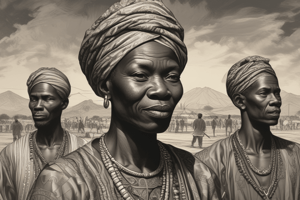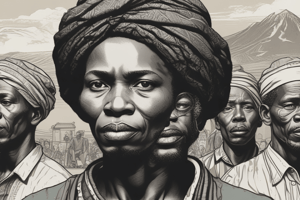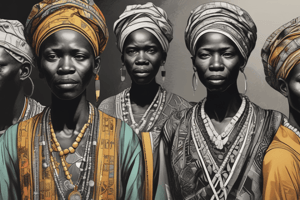Podcast
Questions and Answers
Steve Biko's death in police custody became a turning point and a rallying cry for anti-______ activism.
Steve Biko's death in police custody became a turning point and a rallying cry for anti-______ activism.
apartheid
The philosophy of self-reliance and defiance against systemic oppression led to greater unity and political ______ across South Africa.
The philosophy of self-reliance and defiance against systemic oppression led to greater unity and political ______ across South Africa.
activism
The momentum created by the Black Consciousness Movement drew international ______ and support for the anti-apartheid movement.
The momentum created by the Black Consciousness Movement drew international ______ and support for the anti-apartheid movement.
attention
Biko's writings and his ______ lived on, continuing to inspire resistance within South Africa.
Biko's writings and his ______ lived on, continuing to inspire resistance within South Africa.
The Black Consciousness philosophy instilled a sense of pride and ______ among black South Africans.
The Black Consciousness philosophy instilled a sense of pride and ______ among black South Africans.
The philosophy of Black Consciousness aimed to instill pride and ______ among black South Africans.
The philosophy of Black Consciousness aimed to instill pride and ______ among black South Africans.
The Black Consciousness Movement was founded by black university students, particularly under the leadership of ______.
The Black Consciousness Movement was founded by black university students, particularly under the leadership of ______.
Biko’s famous statement, 'The most potent weapon in the hands of the oppressor is the ______ of the oppressed,' encapsulates the BCM’s mission.
Biko’s famous statement, 'The most potent weapon in the hands of the oppressor is the ______ of the oppressed,' encapsulates the BCM’s mission.
The Soweto Uprising of ______ was a significant act of resistance inspired by the principles of Black Consciousness.
The Soweto Uprising of ______ was a significant act of resistance inspired by the principles of Black Consciousness.
The imposition of ______ as a medium of instruction in schools sparked protests among students.
The imposition of ______ as a medium of instruction in schools sparked protests among students.
BCM promoted the idea that black people needed to free themselves from internalized ______ and psychological oppression.
BCM promoted the idea that black people needed to free themselves from internalized ______ and psychological oppression.
The Black Consciousness Movement emphasized ______, cultural pride, and self-reliance.
The Black Consciousness Movement emphasized ______, cultural pride, and self-reliance.
Through publications, speeches, and grassroots initiatives, the BCM aimed to instill the idea that black people could take charge of their own ______.
Through publications, speeches, and grassroots initiatives, the BCM aimed to instill the idea that black people could take charge of their own ______.
Flashcards are hidden until you start studying
Study Notes
The Philosophy of Black Consciousness
- The Black Consciousness Movement (BCM) emerged in the late 1960s and early 1970s.
- Founded by black university students, it challenged apartheid and the limitations of other anti-apartheid movements.
BCM Principles
- The BCM emphasized self-reliance, cultural pride, and the belief that black people could create their own solutions.
- It was inspired by the idea that black people needed to free themselves from internalized racism and psychological oppression.
- The BCM was highly effective in empowering South Africans to take charge and fight for their rights.
Key Figures
- Steve Biko was a key leader and a pivotal figure in the movement.
- His quote: "The most potent weapon in the hands of the oppressor is the mind of the oppressed," encapsulated the Black Consciousness mission.
The Soweto Uprising of 1976
- The uprising was a demonstration for the right to education in their own language, opposed to Afrikaans.
- It highlighted the regime's fear of the growing influential power of the BCM.
- The impact of this uprising extended beyond students, inspiring labor movements and communities to organize and demand change.
Steve Biko’s Legacy
- Steve Biko's death in police custody in 1977 galvanized the movement.
- His death was a turning point, highlighting the brutality of the apartheid system and the strong influence of the Black Consciousness Movement.
- His writings and legacy continued to inspire generations of activists.
Global Impact
- The BCM's philosophy resonated globally, influencing movements for social justice, equality, and anti-colonialism.
- It drew international attention and support for the anti-apartheid movement.
Conclusion
- The Black Consciousness Movement played a crucial role in empowering South Africans to challenge and fight against apartheid.
- It instilled pride, self-belief, and a sense of unity among black South Africans, contributing to its eventual downfall in the 1990s.
Studying That Suits You
Use AI to generate personalized quizzes and flashcards to suit your learning preferences.




